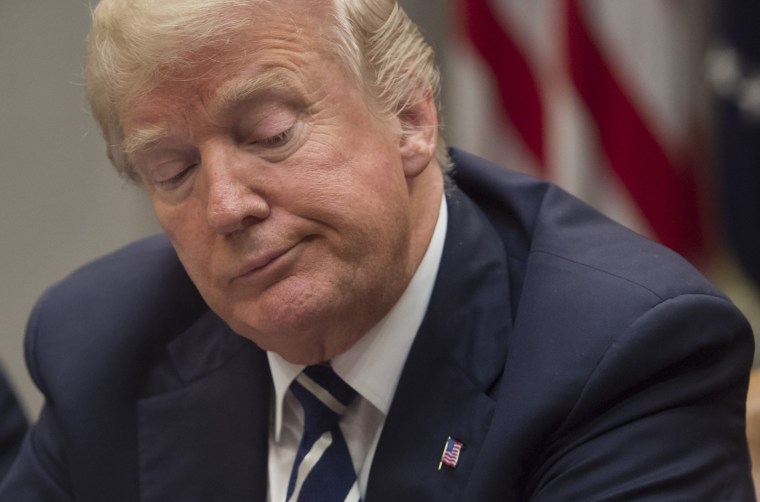Donald Trump's 2017 inaugural address included some memorable rhetoric, but it was the new president's references to violence that stood out. The Republican lamented the crimes "that have stolen too many lives and robbed our country of so much unrealized potential."
Trump added, "This American carnage stops right here and stops right now."
As the public once again tries to process the death toll from the latest American mass shootings, it's painfully obvious that the "carnage" did not, in fact, "stop." Complicating matters, in too many instances, the perpetrators of violence have justified their brutal crimes by echoing political rhetoric they heard from their president.
As a Washington Post piece put it yesterday afternoon, "After yet another mass slaying, the question surrounding the president is no longer whether he will respond as other presidents once did, but whether his words contributed to the carnage."
It was against this backdrop that Trump briefly spoke to reporters yesterday afternoon, saying, "Hate has no place in our country and we're going to take care of it."
Likely aware of the critics who've tied his rhetoric to some of the shooters' motivations, the president added, "This has been going on for years -- for years and years -- in our country."
It was at this point that Trump thought it'd be a good idea to start bragging.
"We're talking to a lot of people, and a lot of things are in the works, and a lot of good things. And we have done much more than most administrations. And it does -- it's not -- really not talked about very much, but we've done, actually, a lot. But perhaps more has to be done."But this is also a mental illness problem. If you look at both of these cases, this is mental illness. These are people -- really, people that are very, very seriously mentally ill. So a lot of things are happening."
As the president spoke about doing "a lot" to address gun violence, while also emphasizing mental health, it was hard not to think of one of the first bills Trump signed into law.
In early 2017, congressional Republicans passed, and the new president signed, a measure to make it easier for the mentally impaired to buy guns. The White House's budget plans have also proposed significant cuts that, if implemented, would've limited access to mental-health services for many Americans.
For that matter, Trump and his party continue to try to eliminate the Affordable Care Act in its entirety, which would, among other things, strip many Americans' access to mental-health services.
What's more, let's not accept the premise of the president's rhetoric at face value. To hear Trump tell it, the perpetrators of mass shootings are sick, so the focus should be on mental health. As important as this element is, it's an argument predicated on the idea that toxic societal elements aren't significant, too.
I'm glad Trump believes "hate has no place in our country," but given the number of dangerous radicals who find solace in his presidency, those seven words aren't sufficient.
He's scheduled to deliver additional remarks on the subject in a couple of hours. Watch this space.
Postscript: On Twitter this morning, Trump suggested tying a background-check bill to immigration reform. The connections between the two are tenuous, at best -- the gunmen weren't immigrants -- and the chances of Congress packaging the issues are poor.
What was less clear, however, was whether Trump was drawing a conditional connection. Should we interpret this morning's tweets as him saying he'll sign a background-check bill only if Congress meets his demands on immigration policy?
